中考英语动词搭配辨析
重难点08 动词和动词短语-2023年中考英语【热点重点难点】专练(全国通用)(解析版)

专项一词汇重难点08动词和动词短语1.实义动词1.1.常考动词的用法辨析(1)look,see,watch,read的区别:(3)borrow,lend,keep的区别:1.2.及物动词和不及物动词(1)及物动词:可接单宾语、双宾语和复合宾语结构。
When someone gives me money, I feel they don't think at all.give后接双宾语(间接宾语+直接宾语)当有人给我钱时,我感觉他们根本就没有思考。
We elected him monitor of our class.elect后接复合宾语(宾语+宾补)我们选他当我们班的班长。
(2)不及物动词:不及物动词后面一般不可以直接接宾语,但有时不及物动词和介词或副词一起使用,构成动词短语,此时其后可以接宾语。
What will happen without electricity?没有电,会发生什么?I'm waiting for the bus.我正在等公交车。
1.3.延续性动词和非延续性动词(1)延续性动词表示一种可持续的行为过程或状态,可以和表示一段时间的状语连用。
而非延续性动词表示行为或过程在短暂瞬间内完成,不可以和表示一段时间的状语连用。
The film has been on for ten minutes.电影已经开始10分钟了。
The film began ten minutes ago.电影10分钟之前就开始了。
(2)延续性动词和非延续性动词的转换:连系动词指连接主语和表语的动词,主要用来说明主语的身份、性质、特征或状态。
连系动词只有主动形式。
2.助动词助动词本身没有词义或意义不完整,不能单独作谓语,只能和实义动词一起构成谓语,表示时态、语态、语气等,帮助构成否定、疑问、强调或省略等。
3.1.助动词be的用法be用作助动词和用作连系动词一样,有人称、数和时态的变化,主要用来构成进行时态和被动语态。
初中英语动词及动词短语考点
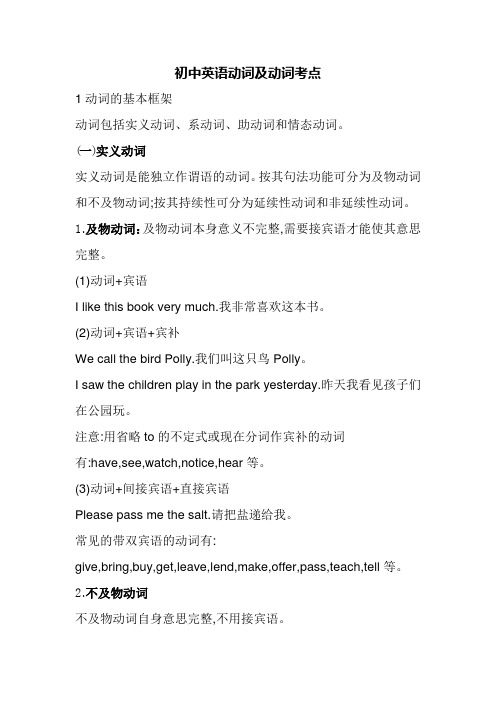
初中英语动词及动词考点1动词的基本框架动词包括实义动词、系动词、助动词和情态动词。
(一)实义动词实义动词是能独立作谓语的动词。
按其句法功能可分为及物动词和不及物动词;按其持续性可分为延续性动词和非延续性动词。
1.及物动词:及物动词本身意义不完整,需要接宾语才能使其意思完整。
(1)动词+宾语I like this book very much.我非常喜欢这本书。
(2)动词+宾语+宾补We call the bird Polly.我们叫这只鸟Polly。
I saw the children play in the park yesterday.昨天我看见孩子们在公园玩。
注意:用省略to的不定式或现在分词作宾补的动词有:have,see,watch,notice,hear等。
(3)动词+间接宾语+直接宾语Please pass me the salt.请把盐递给我。
常见的带双宾语的动词有:give,bring,buy,get,leave,lend,make,offer,pass,teach,tell等。
2.不及物动词不及物动词自身意思完整,不用接宾语。
Horses run fast.马跑得快。
(1)有些动词既可作及物动词又可作不及物动词。
We study English.我们学习英语。
(及物动词)We study hard.我们努力学习。
(不及物动词)(2)有些不及物动词与一些别的词搭配在一起构成动词短语,它的作用相当于一个及物动词。
①动词+介词Listen to the teacher carefully.仔细听老师讲。
此类动词短语后面的宾语无论是名词还是代词,都只能放在介词后面,不能放在动词和介词之间。
②动词+副词+介词Let’s go on with our work!让我们继续我们的工作吧!He gets along well with his classmates.他与他的同学们相处得很好。
初三中考中的英语动词短语辨析含解析
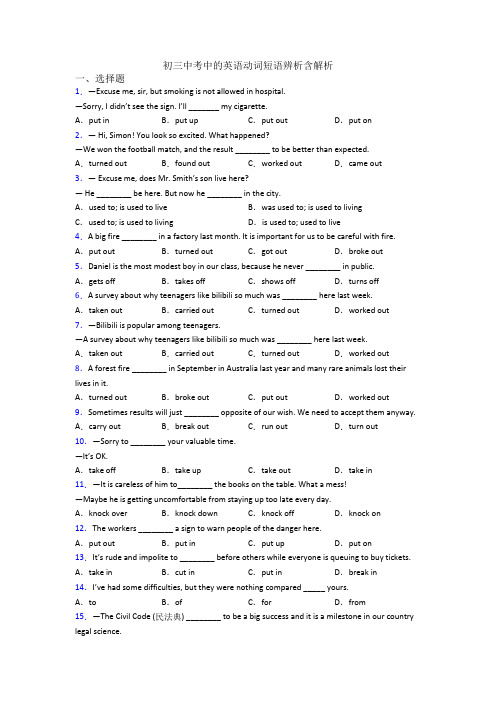
初三中考中的英语动词短语辨析含解析一、选择题1.—Excuse me, sir, but smoking is not allowed in hospital.—Sorry, I didn’t see the sign. I’ll _______ my cigarette.A.put in B.put up C.put out D.put on2.— Hi, Simon! You look so excited. What happened?—We won the football match, and the result ________ to be better than expected. A.turned out B.found out C.worked out D.came out 3.— Excuse me, does Mr. Smith’s son live here?— He ________ be here. But now he ________ in the city.A.used to; is used to live B.was used to; is used to livingC.used to; is used to living D.is used to; used to live4.A big fire ________ in a factory last month. It is important for us to be careful with fire. A.put out B.turned out C.got out D.broke out 5.Daniel is the most modest boy in our class, because he never ________ in public.A.gets off B.takes off C.shows off D.turns off6.A survey about why teenagers like bilibili so much was ________ here last week. A.taken out B.carried out C.turned out D.worked out 7.—Bilibili is popular among teenagers.—A survey about why teenagers like bilibili so much was ________ here last week.A.taken out B.carried out C.turned out D.worked out8.A forest fire ________ in September in Australia last year and many rare animals lost their lives in it.A.turned out B.broke out C.put out D.worked out 9.Sometimes results will just ________ opposite of our wish. We need to accept them anyway. A.carry out B.break out C.run out D.turn out 10.—Sorry to ________ your valuable time.—It’s OK.A.take off B.take up C.take out D.take in11.—It is careless of him to________ the books on the table. What a mess!—Maybe he is getting uncomfortable from staying up too late every day.A.knock over B.knock down C.knock off D.knock on 12.The workers ________ a sign to warn people of the danger here.A.put out B.put in C.put up D.put on13.It’s rude and impolite to ________ before others while everyone is queuing to buy tickets. A.take in B.cut in C.put in D.break in14.I’ve had some difficulties, but they were nothing compared _____ yours.A.to B.of C.for D.from 15.—The Civil Code (民法典) ________ to be a big success and it is a milestone in our country legal science.—I can’t agree more.A.turns out B.puts out C.takes out D.breaks out 16.—We have waited for Tom for half an hour. Why hasn’t he ________ yet?—He may have got lost. Let me call him.A.cheered up B.taken up C.stayed up D.shown up17.—I ________ reading English every morning.—Yes, English is very important and it ________ the first language in England and some other countries.A.used to; is used by B.used to; is used asC.am used to; is used as D.am used to; is used by18.Last week a fireman came to our school and told us what to do if a fire ________. A.breaks out B.works out C.puts out D.runs out 19.Volunteers ________ leaflets to encourage more people to separate rubbish correctly. A.put out B.find out C.hand out D.turn out20.My sister seldom spends time on TV or computer at weekends because reading ________ most of her free time.A.takes on B.takes up C.takes away D.takes off 21.—What time does the first train to Beijing leave?—Wait a minute. I am just ________ the train times.A.taking up B.picking up C.making up D.looking up 22.Make sure that you have prepared everything well before you ________ the plan. A.carry out B.break out C.turn out D.put out 23.—How terrible the disaster is! Many people lose their homes and most of them are badly hurt.—I’m sure things are going to ________ fine because the soldiers, the most lovely people, are trying to help them.A.find out B.turn out C.run out D.put out 24.—Dad,would you please____a brighter light in my bedroom?—Certainly.A.put in B.hand out C.hand in D.put out25.All of us had a good time during this year’s May Day holiday because we ________ five days________ .A.had...off B.took...off C.put...off D.turned...off 26.—How was your May Day holiday?—Just so-so. We drove to Suzhou and tried to find a place for parking, but they were all________. A.turned up B.stayed up C.taken up D.put up 27.Would you please ____________ the light? I can't sleep well with it on.A.turn on B.turn off C.turn to D.turn around 28.— How can I get good grades in the listening test, Miss Lin?— You can the questions quickly before listening.A.look through B.go over C.pay attention to D.take notice of 29.—I’m sorry to ________ on you, but there is something I don’t understand.—It doesn’t matter.A.cut down B.cut out C.cut in D.cut off30.Far water does not ________ near fire.A.put up B.put away C.put out D.put in31.—In order to improve my English, I have already made a detailed plan.—Great! I think all you need to do next is _________.A.pick it out B.carry it out C.find it out D.point it out 32.Much to everyone’s surprise, Hi, Mom ________ to be a biggest hit.A.turns out B.puts out C.carries out D.breaks out 33.—Oh, my God! I have ________ 5 pounds!—No worries. It’s normal for a growing teenager.A.put up B.put down C.put on D.put off34.-Oh,my God! I have ________ five pounds!-No worries. It’s normal for a growing teenage girl.A.put up B.put down C.put on D.put off35.It ________ the director of Hi, Mom has become one of China’s most successful female filmmakers.A.runs out B.breaks out C.hands out D.turns out 36.Do you think it is necessary to ________ a special home for the elderly with life difficulties. A.set out B.set up C.set down D.set off37.We are supposed to ________ smart phones and take more exercise instead.A.put up B.put away C.put on D.put out38.He always ________ his friends about everything. In fact, he has no thoughts of his own. A.talks with B.plays withC.deals with D.agrees with39.Bob is busy taking the desks and chairs away because they ___________ too much room in the hall.A.pick up B.take up C.put up D.cheer up 40.— Excuse me, which is the way to Kaiming Middle School?— ________ this street, and you’ll find it on your right.A.Write down B.Go down C.Lie down D.Sit down41.As a volunteer, he often goes to the hospital to ________ the sick.A.cheer for B.help for C.put up D.cheer up42.My brother often _________ his spare time to help me with my spoken English.A.puts up B.gives up C.opens up D.tidies up 43.Every time a serious disease ________, city planners will come up with new ideas to fight it. A.breaks down B.breaks out C.breaks into D.breaks up44.I know how busy you must be and naturally I wouldn’t want to ________ too much of your time.A.put up B.take up C.give up D.make up 45.The person who ________ a new idea of how to work out the puzzle will be given a(n)________.A.keeps up with; praise B.comes up with; prize C.ends up with; price D.puts up with; award46.—Your spoken English is very good. How do you improve it?—Thanks. Mrs. Wang always asks us to ________ dialogues in our English classes and practice speaking English as often as possible.A.take up B.make up C.put up D.mop up47.________ the way you talk. You won’t want to make others feel uncomfortable.A.Pay attention to B.Hold on toC.Come up with D.End up with48.My father is crazy about DIY. He’s trying to ________ a cupboard in the kitchen.A.put up B.put in C.put on D.put away49.I know how busy you must be and I wouldn’t want to ________ too much of your time. A.put up B.take up C.set up D.make up 50.Based on local cultures and museums, schools should develop local courses ________ art, history, geography, and biology.A.led to B.taken on C.chosen from D.connected with 【参考答案】***试卷处理标记,请不要删除一、选择题1.C解析:C【详解】句意:——对不起,先生,医院里不允许吸烟。
初三中考英语动词短语辨析教案含答案

初三中考英语动词短语辨析教案含答案一、选择题1.Judy waited a long time for her mom, but she didn't ________.A.show up B.get up C.wake up D.stay up 2.Sometimes results will just ________ opposite of our wish. We need to accept them anyway. A.carry out B.break out C.run out D.turn out3.The meeting was supposed to ________ on Tuesday, but we’ve had to put it off.A.turn on B.turn out C.take place D.take up 4.—Excuse me, does Mr. Smith’s son live here?— He ________ be here. But now he ________ in the city.A.used to; is used to live B.was used to; is used to livingC.used to; is used to living D.is used to; used to live5.—Sorry to ________ your valuable time.—It’s OK.A.take off B.take up C.take out D.take in6.The director of Up series passed away, and the workmates are thinking about whether the documentary can ________ without him.A.carry on B.carry out C.take on D.take out7.This bus doesn’t go to the train station. I am afraid you will have to ________ at the next stop and take BRT Line 1.A.get out B.get off C.get through D.get down 8.—We have waited for Tom for half an hour. Why hasn’t he ________ yet?—He may have got lost. Let me call him.A.cheered up B.taken up C.stayed up D.shown up9.It’s rude and impolite to ________ before others while everyone is queuing to buy tickets. A.take in B.cut in C.put in D.break in10.Last week a fireman came to our school and told us what to do if a fire ________. A.breaks out B.works out C.puts out D.runs out 11.—Aunt Lexie, could you please teach me how to _________ "red envelope" on WeChat?—Certainly. It goes like this.A.give away B.give up C.give back D.give out 12.Please _____ the water when you brush your teeth.A.take down B.turn up C.take away D.turn off13.I’ve had some difficulties, but they were nothing compared _____ yours.A.to B.of C.for D.from14.The book is written by T. C.Smith.What does the “T. C.”?A.pay attention to B.regard as C.stand for D.set off 15.—Dad,would you please____a brighter light in my bedroom?—Certainly.A.put in B.hand out C.hand in D.put out 16.Scientists need to ________ several surveys before making a conclusion.A.give up B.carry out C.hear of D.look for 17.—What can I do for you, Linda?—I hope you can help me ________ the useless words in my article.A.make up B.cut out C.turn off D.put up18.My father always tells me to ________ any possible challenge myself instead of giving up easily!A.take away B.take off C.take up D.take on 19.—The Civil Code (民法典) ________ to be a big success and it is a milestone in our country legal science.—I can’t agree more.A.turns out B.puts out C.takes out D.breaks out 20.The rain has stopped. Why not ________ the raincoat?A.take away B.pass away C.put away D.put off 21.Volunteers ________ leaflets to encourage more people to separate rubbish correctly. A.put out B.find out C.hand out D.turn out 22.There’s no doubt the Belt and Road will successfully ________ cooperation and development between China and other countries along the line.A.push for B.care for C.look for D.hope for 23.Would you please ____________ the light? I can't sleep well with it on.A.turn on B.turn off C.turn to D.turn around 24.— How can I get good grades in the listening test, Miss Lin?— You can the questions quickly before listening.A.look through B.go over C.pay attention to D.take notice of 25.—I’m sorry to ________ on you, but there is something I don’t understand.—It doesn’t matter.A.cut down B.cut out C.cut in D.cut off26.Far water does not ________ near fire.A.put up B.put away C.put out D.put in27.Muc h to everyone’s surprise, Hi, Mom ________ to be a biggest hit.A.turns out B.puts out C.carries out D.breaks out 28.—Oh, my God! I have ________ 5 pounds!—No worries. It’s normal for a growing teenager.A.put up B.put down C.put on D.put off29.I promise I won’t ________ any more of your time. But would you please reply to my question right away?A.give up B.make up C.put up D.take up30.We are supposed to ________ smart phones and take more exercise instead.A.put up B.put away C.put on D.put out 31.Steve Jobs was a great man who ________ the use of digital music.A.pushed away B.pushed for C.pulled out D.put in 32.—Many students don’t know how to ________ stress and become worried.—I think they’d better ask their teachers for help.A.argue with B.come up with C.deal with33.Bob is busy taking the desks and chairs away because they ___________ too much room in the hall.A.pick up B.take up C.put up D.cheer up 34.—All right, I’ll take it. But I tell you, it is the last time I will _________ this kind of wo rk —Come on, Buddy! Don’t be so serious.A.take off B.take out C.take on D.take up35.I know how busy you must be and naturally I wouldn’t want to ________ too much of your time.A.take on B.take away C.take up D.take off36.— Excuse me, which is the way to Kaiming Middle School?—________ this street, and you’ll find it on your right.A.Write down B.Go down C.Lie down D.Sit down37.My brother often _________ his spare time to help me with my spoken English.A.puts up B.gives up C.opens up D.tidies up38.We should ________ the job bravely instead of complaining too much. It’s our duty! A.take away B.take up C.take on D.take off 39.Children’s Day is on the way. Many shops have ________ huge posters with the word “SALE”. A.put on B.put in C.put away D.put up 40.Every time a serious disease ________, city planners will come up with new ideas to fight it. A.breaks down B.breaks out C.breaks into D.breaks up41.I know how busy you must be and naturally I wouldn’t want to ________ too much of your time.A.put up B.take up C.give up D.make up 42.—Why did Linda come to China?—To experience Chinese culture and ________ the most suitable university to attend.A.turn out B.put out C.run out D.find out43.The person who ________ a new idea of how to work out the puzzle will be given a(n)________.A.keeps up with; praise B.comes up with; prize C.ends up with; price D.puts up with; award44.—Your spoken English is very good. How do you improve it?—Thanks. Mrs. Wang always asks us to ________ dialogues in our English classes and practice speaking English as often as possible.A.take up B.make up C.put up D.mop up45.—What do the students think of this book?—It’s really a good book. They all________it.A.look over B.think about C.think highly of D.win the heart of 46.—Who is the best basketball player in your class?—Daniel. And he takes any chance to ________ his sports skills to girls.A.take off B.turn off C.fall off D.show off47.If parents do everything for their children, they won’t learn to ________ themselves. A.depend on B.get on C.put on D.come on48.My father is crazy about DIY. He’s trying to ________ a cupboard in the kitchen.A.put up B.put in C.put on D.put away 49.—Have you made a plan to raise money to protect the animals in danger?—Yes. Now we are thinking about how to ________.A.pick it out B.carry it out C.find it out D.put it out 50.Based on local cultures and museums, schools should develop local courses ________ art, history, geography, and biology.A.led to B.taken on C.chosen from D.connected with 【参考答案】***试卷处理标记,请不要删除一、选择题1.A解析:A【详解】句意:Judy等妈妈很长时间,但是她没有出现。
中考英语必考动词的分类及辨析
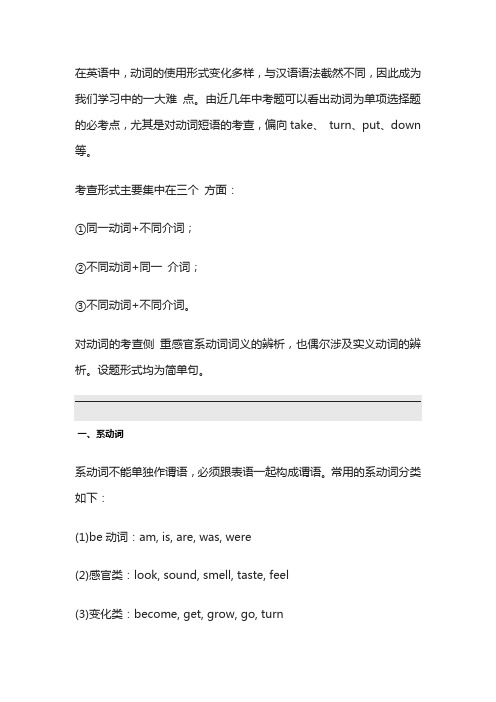
在英语中,动词的使用形式变化多样,与汉语语法截然不同,因此成为我们学习中的一大难点。
由近几年中考题可以看出动词为单项选择题的必考点,尤其是对动词短语的考查,偏向take、turn、put、down 等。
考查形式主要集中在三个方面:①同一动词+不同介词;②不同动词+同一介词;③不同动词+不同介词。
对动词的考查侧重感官系动词词义的辨析,也偶尔涉及实义动词的辨析。
设题形式均为简单句。
一、系动词系动词不能单独作谓语,必须跟表语一起构成谓语。
常用的系动词分类如下:(1)be动词:am, is, are, was, were(2)感官类:look, sound, smell, taste, feel(3)变化类:become, get, grow, go, turn(4)状态类:keep, stay二、助动词助动词本身没有词义,不能单独作谓语,只能和其他动词一起构成谓语,表示时态、语态、语气等特征,共同构成否定、疑问、强调、省略等句子。
主要的助动词有be, have, has, had, do, does, did, will, would 和shall等。
三、实义动词实义动词是能独立作谓语的动词。
按其语法作用分为及物动词和不及物动词;按其持续性可分为延续性动词和非延续性动词。
1.及物动词及物动词本身意义不完整,需要接宾语才能使其意思完整。
(1)动词+宾语如:Can you open the window?(2)动词+宾语+宾补如:We call him Bill.I saw Tom play in the park yesterday.注意:用省略to的不定式或现在分词作宾补的动词有make, let, see, watch, hear, notice等。
(3)动词+间接宾语+直接宾语如:May I ask you a question?Please pass me the book.常见的带双宾语的动词有:give, bring, buy, get, lend, offer, pass, teach, tell, write, return等。
(英语)中考英语短语动词易错剖析含解析
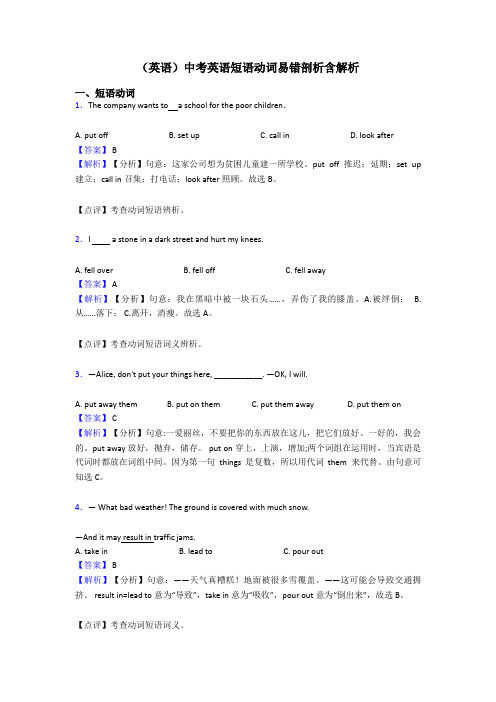
(英语)中考英语短语动词易错剖析含解析一、短语动词1.The company wants to a school for the poor children.A. put offB. set upC. call inD. look after【答案】 B【解析】【分析】句意:这家公司想为贫困儿童建一所学校。
put off推迟;延期;set up 建立;call in召集;打电话;look after照顾。
故选B。
【点评】考查动词短语辨析。
2.I a stone in a dark street and hurt my knees.A. fell overB. fell offC. fell away【答案】 A【解析】【分析】句意:我在黑暗中被一块石头……,弄伤了我的膝盖。
A.被绊倒; B.从……落下; C.离开,消瘦。
故选A。
【点评】考查动词短语词义辨析。
3.—Alice, don't put your things here, ___________. —OK, I will.A. put away themB. put on themC. put them awayD. put them on【答案】 C【解析】【分析】句意:一爱丽丝,不要把你的东西放在这儿,把它们放好。
一好的,我会的。
put away放好,抛弃,储存。
put on穿上,上演,增加;两个词组在运用时,当宾语是代词时都放在词组中间。
因为第一句things是复数,所以用代词them 来代替。
由句意可知选C。
4.— What bad weather! The ground is covered with much snow.—And it may result in traffic jams.A. take inB. lead toC. pour out【答案】 B【解析】【分析】句意:——天气真糟糕!地面被很多雪覆盖。
初中英语中考专题复习——动词语境辨析(实义动词+近义动词+感官动词)
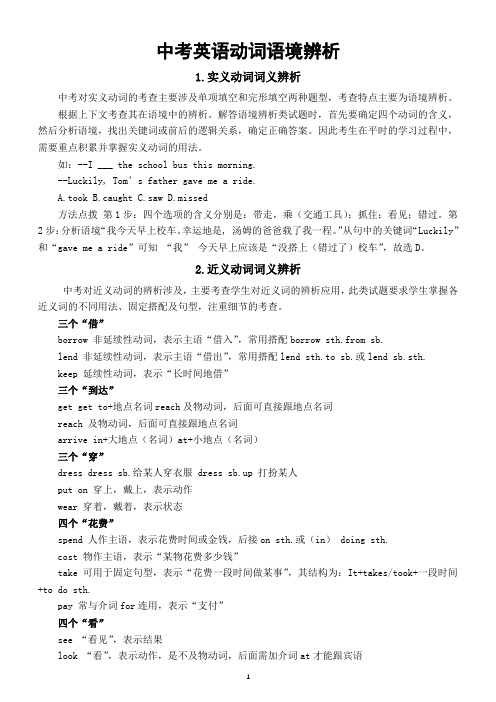
中考英语动词语境辨析1.实义动词词义辨析中考对实义动词的考查主要涉及单项填空和完形填空两种题型,考查特点主要为语境辨析。
根据上下文考查其在语境中的辨析。
解答语境辨析类试题时,首先要确定四个动词的含义,然后分析语境,找出关键词或前后的逻辑关系,确定正确答案。
因此考生在平时的学习过程中,需要重点积累并掌握实义动词的用法。
如:--I ___ the school bus this morning.--Luckily, Tom’s father gave me a ride.A.tookB.caughtC.sawD.missed方法点拨第1步:四个选项的含义分别是:带走,乘(交通工具);抓住;看见;错过。
第2步:分析语境“我今天早上校车。
幸运地是, 汤姆的爸爸载了我一程。
”从句中的关键词“Luckily”和“gave me a ride”可知“我”今天早上应该是“没搭上(错过了)校车”,故选D。
2.近义动词词义辨析中考对近义动词的辨析涉及,主要考查学生对近义词的辨析应用,此类试题要求学生掌握各近义词的不同用法、固定搭配及句型,注重细节的考查。
三个“借”borrow 非延续性动词,表示主语“借入”,常用搭配borrow sth.from sb.lend 非延续性动词,表示主语“借出”,常用搭配lend sth.to sb.或lend sb.sth.keep 延续性动词,表示“长时间地借”三个“到达”get get to+地点名词reach及物动词,后面可直接跟地点名词reach 及物动词,后面可直接跟地点名词arrive in+大地点(名词)at+小地点(名词)三个“穿”dress dress sb.给某人穿衣服 dress sb.up 打扮某人put on 穿上,戴上,表示动作wear 穿着,戴着,表示状态四个“花费”spend 人作主语,表示花费时间或金钱,后接on sth.或(in) doing sth.cost 物作主语,表示“某物花费多少钱”take 可用于固定句型,表示“花费一段时间做某事”,其结构为:It+takes/took+一段时间+to do sth.pay 常与介词for连用,表示“支付”四个“看”see “看见”,表示结果look “看”,表示动作,是不及物动词,后面需加介词at才能跟宾语watch “观看(比赛、电视等)”read “看(书、报等)”,表示阅读四个“说”speak 作及物动词时后接表示语言的名词,表示“说,讲述”say 常跟直接引语或间接引语,表示说的内容talk 是不及物动词,常跟介词to和with,意为“同……谈话”,也表示具有说话能力tell 意为“告诉”,与story连用,意为“讲故事”四个“拿”bring “带来,拿来”,表示拿到靠近说话人的地方take “拿去,带走”,表示拿到远离说话人的地方carry “扛,搬,用力移动”,没有方向fetch “去取,去拿”,表示往返拿东西四个“赢,输”lose 意为“输给”某人,固定搭配为lose to sb.fail 意为“失败”或“未做成某事”beat 意为“打败”,后接人或某支队伍win 意为“赢得,荣誉,地位,比赛等”四个“参加”join 一般指加入“党派”或“组织”并成为其中一员,如参军,入党,入团等join in 指参加竞赛、娱乐、游戏等活动take part in 指参加聚会或群众性活动attend 一般指出席会议、典礼、婚礼等四个“变化”turn 一般用于颜色的变化get 天变黑、变长或变短become 天气变暖或变冷等,表示渐变grow 形状变大或变小3.感官动词词义辨析sound 意为“听起来……”指听觉。
【中考英语、英语语法】【人教版】中考英语动词及动词短语考点剖析
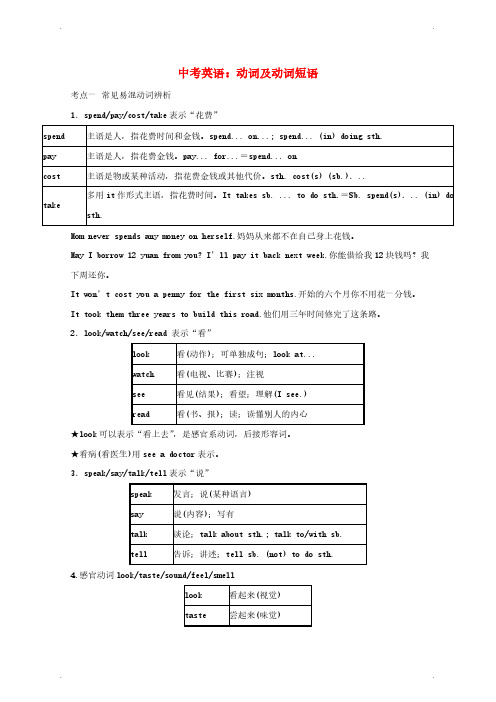
中考英语:动词及动词短语考点一常见易混动词辨析1.spend/pay/cost/take表示“花费”spend主语是人,指花费时间和金钱。
spend... on...; spend... (in) doing sth.pay主语是人,指花费金钱。
pay... for...=spend... oncost主语是物或某种活动,指花费金钱或其他代价。
sth. cost(s) (sb.)...多用it作形式主语,指花费时间。
It takes sb. ... to do sth.=Sb. spend(s)... (in) doin takesth.Mom never spends any money on herself.妈妈从来都不在自己身上花钱。
May I borrow 12 yuan from you? I’ll pay it back next week.你能借给我12块钱吗?我下周还你。
It won’t cost you a penny for the first six months.开始的六个月你不用花一分钱。
It took them three years to build this road.他们用三年时间修完了这条路。
2.look/watch/see/read 表示“看”look看(动作);可单独成句;look at...watch看(电视、比赛);注视see看见(结果);看望;理解(I see.)read看(书、报);读;读懂别人的内心★look可以表示“看上去”,是感官系动词,后接形容词。
★看病(看医生)用see a doctor表示。
3.speak/say/talk/tell表示“说”speak发言;说(某种语言)say说(内容);写有talk谈论;talk about sth.; talk to/with sb.tell告诉;讲述;tell sb. (not) to do sth.4.感官动词look/taste/sound/feel/smelllook看起来(视觉)taste尝起来(味觉)sound听起来(听觉)feel摸起来(触觉)smell闻起来(嗅觉)5.borrow/lend/keep表示“借”borrow借用;borrow sth. from sb.lend借给;lend sth. to sb.keep借用若干时间;keep... for 2 days6.hope/wish/expecthope希望;hope to to sth.; hope+that 从句wish但愿、希望;wish to do sth.; wish sb. to do sth.; wish+that 从句expect期待、期望; expect to do sth.; expect sb. to do sth.7.forget/leaveforget表示“忘记”时,forget通常不能与表示地点的副词或短语连用leave在表示“遗忘”时,通常要与表示地点的状语连用8.hear/listen/soundhear听见;hear+名词(强调听的结果)listen听;listen to+名词(强调听的过程)sound听起来; sound+形容词(强调听的效果)9.wear/put on/dress/be inwear“穿着;戴着”,强调状态,wear后可接穿戴的东西,包括眼镜、首饰等put on“穿上;戴上”,指“穿”的动作,反义词为“take off”“穿衣”,是及物动词,后接人作宾语,意为“给某人穿衣服”;dress onself“打扮;给自己穿dress衣服”be in表示状态,后接衣服,也可接表颜色的词10.reach/get/arrivereach“到达”,是及物动词(比get更正式),其后可直接接地点名词作宾语(不能用介词)get“到达”,不及物动词,之后通常接介词 toarrive“到达”,不及物动词,之后通常接介词 at (一般用于较小的地方)或 in (一般用于较大的地方)1.(2018·山东菏泽单县常青学校模拟三)—I meeting Jack today because I am still angry with him.—Come on, Mary. You are good friends.A.avoid B.expect C.enjoy2.(2018·广东普宁模拟改编)I don’t know the restaurant, but it’s to be quite a good one.A.said B.told C.spoken3.(2018·广西贵港港南二模改编)—How much money did he you yesterday?—500 yuan. I told him I would return it to him in three weeks.A.give B.borrow C.lend4.(2018·甘肃定西中考改编)—I can’t find my English textbook.—Is it possible that you it at home?A.lost B.forgot C.left5.(2018·四川泸州中考改编)It about eight minutes for the light to travel from the sun to the earth.A.costs B.spends C.takes考点二动词短语辨析常考的动词短语辨析有三种:第一种是同一动词的不同搭配;第二种是同一副词或介词与不同动词的搭配;第三种是完全不同的动词短语。
中考英语重点动词辨析精华

中考英语重点动词辨析精华②Those old cars will be_________ for scrap(废铁).③Last night somebody_________ Mr. Brown's house and took away many things.④A fire ______after we had gone home.⑤The boy often________ while his parents are speaking.⑥You must ________from bad habits.⑦After the heavy rain the sun ______ the clouds.⑧A thief ________ and stole a lot of things last night.⑨Tom _______the motor bike which he bought five years ago.⑩The ice began to________ on the river.【①had broken down ②broken up ③broke into ④broke out ⑤breaks in⑥break away ⑦broke through ⑧broke in ⑨broke down ⑩break up】②His grandmother and his father ______ him ______...③His new business _______ 1,000 dollars④The sudden cold weather ________his cold again⑤________ the meaning more clearly⑥They have ________ a set of children’s books【①brings on ②brought up ③brings in ④brought on⑤Bring out⑥brought out】①The high winds yesterday _________thousands of trees.② We sometimes had quarrels, but they soon ________ .③ I had my hat ________ by the wind④A lot of dust_______ .You must clear it away⑤When Mary told Kate she’d told his past, she _______.【① blew down② blew over③ blown off ④ has blown in⑤blew up】②I _______ the Smiths yesterday.③I ________ the Smith's yesterday.④The headmaster ________ the students to work harder.⑤She can still _______ scenes of childhood.⑥How many friends will you _______?⑦We had to _______ the meeting because of the weather.⑧I'll ______ from the bottom of my heart: thank you, my teacher!【①called at②called on③called at④called on⑤call up⑥call in⑦call off⑧call out】②These flowers ______ a pleasant smell.③The doctor advised my father to _______ smoking.④We decided to _______ to the wish of the majority(多数人).⑤In two months our food will _______.⑥They felt like they were _______ company secrets.【①give up②give off ③give up④give in ⑤give out⑥giving away】①They will hold off their decision until Monday.②Hearing the news, she couldn’t ______ her tears coming down her cheeks.③“_____, please. I heard a pleasant voice on the phone.④How long will our food ______?⑤These measures(措施) helped to _____ the city’s development of population.⑥The water won’t _____ much longer.【①hold off②hold back③hold on④hold out⑤hold down⑥ hold out】①We will ______ the new play next month.②Can you ___ me_____ to this number?③_____the books______ after reading.④It took the fire-fighters four hours to ______ the fire.⑤The sports meet will be______ because of the bad weather.⑥Many new high buildings have been ______ in our city.⑦________ the gentleman’s address.⑧Can you help me _______ an album?【①put on②put…through③Put …away④put out⑤put off⑥put up⑦Put down⑧put out】8. come about come along come by come down come for come on come out①How did you _____- that ticket?②If you buy three bottles, the bottle price _______ to £2.42...③Their talk is often hard to understand but their expression still _______.④When does her new book _______?⑤You sure you don't want to _______?⑥_______ those pictures you had me take?⑦I had two miles to go and it was just _______to rain.⑧It’s a warm spring, the leaves _______earlier.⑨He’s too old to ________ a fall like that.⑩How’s Frank _________?⑾How did this ________?【①come by②comes down③comes through④come out⑤come along⑥Come for⑦coming on ⑧come out⑨come through⑩coming along⑾come about】②He could have _______ the papers in less than ten minutes.③His eyes seemed to ________ her, straight to her heart.④_______ or you will catch cold.⑤I'm going to _______ and see what I can find.⑥He happened to _______ the medical book,⑦The city government of Wuhan needs to ________ the case quickly.⑧I'll try to _____ him _____, ask him a few questions...⑨You______ today. What's wrong with you?⑩I can ________, but I will still move forward.【①Look up②looked over③look through④Look out⑤look around⑥look through⑦look into⑧look … up⑨ look blue ⑩look back】①I forgot to ______ his telephone number.②But who else would ______so many?③Looking up into his eyes, she seemed to ______all he said.④I ______ it _____, I think perhaps I am an extrovert...⑤A father is ________t his daughter for a celebratory dinner.⑥Where does the second murder _______?⑦I went to the library and ____your books ______...⑧Do you _____ your mother or father?⑨We eventually _____at 11 o'clock and arrived in Venice at 1.30.【①take down②take in③take in④take back⑤taking out⑥take place⑦took back⑧take after⑨took off】。
中考英语语法专项 动词词义辨析[1]
![中考英语语法专项 动词词义辨析[1]](https://img.taocdn.com/s3/m/c0f8666227284b73f24250f5.png)
动词词义辨析动词是是各类考试的重点,动词辨义主要指:1、形状相同的动词之间辨义。
如:lie, lay; hanged, hung; rise, raise; sit, seat等。
2、意义相近的动词之间辨义。
如:borrow, lend; speak, say, talk; hope, wish等。
3、动词与其它词形相近、意义相似的词的辨义。
如:advise, advice; cost, worth; pass, past 等。
4、意义不同,但容易混淆的动词的辨义。
如:explain, say; discover, invent, uncover; find, find out等。
5、某些常用动词的习惯用法的辨义。
如:ask, give, call, make, find, get, keep, want, see, hear等。
6、某些常用动词短语的辨义。
如:give in, give up, turn on, turn off, turn down, turn up等。
(一)易混动词2、rise和raise:rise是不及物动词,其过去式是rose,过去分词是risen,而raise是及物动词,是规则动词。
3、hear与listen to:hear侧重点是听到,听见什么,而listen to是侧重于听的倾向,但hear 用于无意中的听见,而listen to却用于集中注意力的听。
4、see, watch和look:see用作看电影,剧目;watch则用作看电视比赛,而watch还有在旁观看之意。
如:Are you going to play or only watch?;look一般用作不及物动词,只是当盯着某人看时用作及物动词,如:The little boy looked me in the face.(小男孩直盯着我的脸。
)5、wind和wound:wind意为蜿蜒而行,其过去式与过去分词都是wound,而动词原形wound意为伤害,其过去式、过去分词都是wounded。
中考英语备课指导:专题复习——动词词组及词义辨析知识讲解和原题
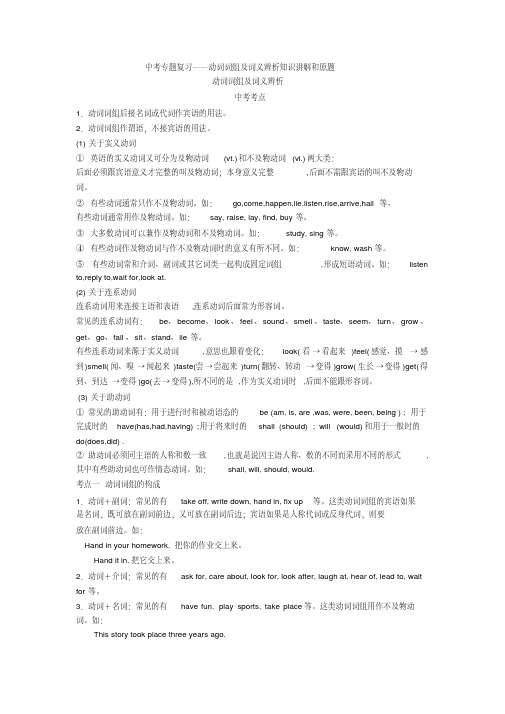
中考专题复习——动词词组及词义辨析知识讲解和原题动词词组及词义辨析中考考点1.动词词组后接名词或代词作宾语的用法。
2.动词词组作谓语,不接宾语的用法。
(1) 关于实义动词①英语的实义动词又可分为及物动词(vt.)和不及物动词(vi.)两大类:后面必须跟宾语意义才完整的叫及物动词;本身意义完整,后面不需跟宾语的叫不及物动词。
②有些动词通常只作不及物动词。
如:go,come,happen,lie,listen,rise,arrive,hall等。
有些动词通常用作及物动词。
如:say, raise, lay, find, buy等。
③大多数动词可以兼作及物动词和不及物动词。
如:study, sing等。
④有些动词作及物动词与作不及物动词时的意义有所不同。
如:know, wash等。
⑤有些动词常和介词、副词或其它词类一起构成固定词组,形成短语动词。
如:listen to,reply to,wait for,look at.(2) 关于连系动词连系动词用来连接主语和表语,连系动词后面常为形容词。
常见的连系动词有:be、become、look、feel、sound、smell、taste、seem、turn、grow、get、go、fall、sit、stand、lie 等。
有些连系动词来源于实义动词,意思也跟着变化:look(看→看起来)feel(感觉、摸→感到)smell(闻、嗅→闻起来)taste(尝→尝起来)turn(翻转、转动→变得)grow(生长→变得)get(得到、到达→变得)go(去→变得),所不同的是,作为实义动词时,后面不能跟形容词。
(3) 关于助动词①常见的助动词有:用于进行时和被动语态的be (am, is, are ,was, were, been, being ) ;用于完成时的have(has,had,having) ;用于将来时的shall (should) ; will (would)和用于一般时的do(does,did) .②助动词必须同主语的人称和数一致,也就是说因主语人称、数的不同而采用不同的形式,其中有些助动词也可作情态动词。
中考英语考点常用动词短语的固定搭配

中考英语考点常用动词短语的固定搭配一、介绍中考英语考试中,动词短语的固定搭配是一个重要的考点。
掌握这些搭配能够帮助我们正确地理解并使用动词短语,提高我们的英语表达能力。
本文将为大家介绍一些中考英语考点常用动词短语的固定搭配。
二、动词短语的固定搭配1. make a decision:做出决定例句:She made a decision to study abroad after high school.2. take a chance:冒险例句:He decided to take a chance and start his own business.3. keep in touch:保持联系例句:We promised to keep in touch after we graduated from high school.4. give up:放弃例句:Don't give up, keep trying and you will succeed.5. look forward to:期待例句:I'm looking forward to the summer vacation.6. take care of:照顾例句:My sister takes care of our pets when we are on vacation.7. get along with:与...相处例句:She is friendly and gets along well with her classmates.8. come up with:提出例句:Can you come up with a better solution to this problem?9. put off:推迟例句:Due to bad weather, the picnic has been put off until next week.10. give back:归还例句:Remember to give back the books to the library when you finish reading them.三、运用动词短语的固定搭配在考试中,我们要善于运用这些动词短语的固定搭配来更准确地表达我们的意思。
中考英语5大类动词固定搭配重难点梳理
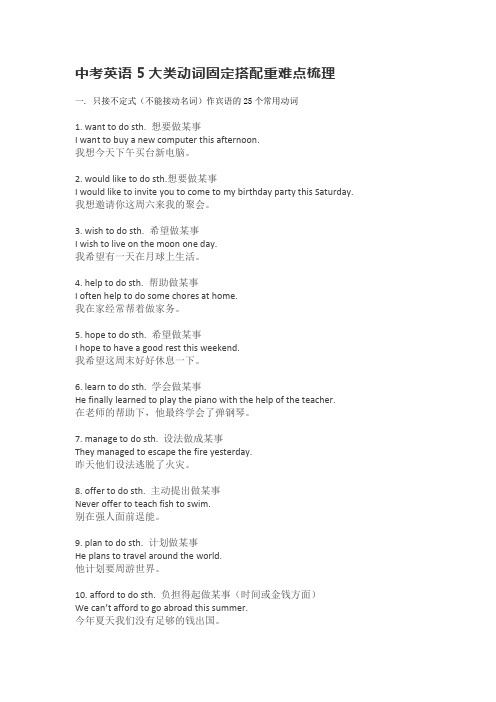
中考英语5大类动词固定搭配重难点梳理一. 只接不定式(不能接动名词)作宾语的25个常用动词1. want to do sth. 想要做某事I want to buy a new computer this afternoon.我想今天下午买台新电脑。
2. would like to do sth.想要做某事I would like to invite you to come to my birthday party this Saturday.我想邀请你这周六来我的聚会。
3. wish to do sth. 希望做某事I wish to live on the moon one day.我希望有一天在月球上生活。
4. help to do sth. 帮助做某事I often help to do some chores at home.我在家经常帮着做家务。
5. hope to do sth. 希望做某事I hope to have a good rest this weekend.我希望这周末好好休息一下。
6. learn to do sth. 学会做某事He finally learned to play the piano with the help of the teacher.在老师的帮助下,他最终学会了弹钢琴。
7. manage to do sth. 设法做成某事They managed to escape the fire yesterday.昨天他们设法逃脱了火灾。
8. offer to do sth. 主动提出做某事Never offer to teach fish to swim.别在强人面前逞能。
9. plan to do sth. 计划做某事He plans to travel around the world.他计划要周游世界。
10. afford to do sth. 负担得起做某事(时间或金钱方面)We can’t afford to go abroad this summer.今年夏天我们没有足够的钱出国。
初中英语常用短语动词搭配以及辨析

初中英语常用短语动词搭配以及辨析本文为您提供初中英语常用短语动词搭配以及它们的辨析。
掌握这些动词搭配可以帮助您更准确地运用英语表达。
- go to: 去某个地方(一般是到一个特定的地点)- go at: 去到某个时间或地点2. take/give + advice- take advice: 接受建议- give advice: 给予建议3. make/do + a decision- make a decision: 做出决定- do a decision: 错误用法,应改为 "make a decision"4. look/watch/see + a movie- look at a movie: 错误用法,应改为 "watch a movie" - see a movie: 看电影5. need/want/require + help- need help: 需要帮助- want help: 想要帮助- require help: 需要帮助(通常指特定的要求)6. listen/hear + to- listen to: 听某个声音或音乐- hear: 听到某个声音7. take/give + a test- take a test: 参加一次考试- give a test: 发布一次考试8. do/make + your best- do your best: 尽力而为- make your best: 错误用法,应改为 "do your best"以上是初中英语常用的一些动词搭配以及它们的辨析。
希望对您的学习有所帮助!。
中考英语常用动词搭配

一、接不定式(而不接动名词)作宾语的常用动词afford to do sth. 担负得起做某事agree to do sth. 赞同做某事arrange to do sth.布置做某事ask to do sth. 要求做某事beg to do sth. 恳求做某事struggle to do sth. 今力做某事choose to do sth. 选择做某事decide to do sth. 决定做某事demand to do sth. 要求做某事determine to do sth. 下决心做某事expect to do sth. 期待做某事fear to do sth. 惧怕做某事help to do sth. 协助做某事hope to do sth. 希望做某事learn to do sth. 学习做某事manage to do sth. 设法做成某事offer to do sth. 自动提出做某事plan to do sth. 计划做某事prepare to do sth. 准备做某事pretend to do sth. 假装做某事promise to do sth. 承诺做某事refuse to do sth. 拒绝做某事want to do sth. 想要做某事wish to do sth. 希望做某事注:有些不及物动词后也接不定式,不接动名词:aim to do sth. 指望着做某事fail to do sth. 未能做某事happen to do sth. 碰巧做某事hesitate to do sth. 犹豫做某事二、接不定式作宾补的常用动词advise sb. to do sth. 建议某人做某事allow sb. to do sth. 允许某人做某事ask sb. to do sth.要求某人做某事tell sb. to do sth. 通知某人做某事beg sb. to do sth. 恳求某人做某事cause sb. to do sth. 造成某人做某事command sb. to do sth. 命令某人做某事drive sb. to do sth .驱使某人做某事elect sb. to do sth. 选举某人做某事encourage sb. to do sth. 鼓励某人做某事expect sb. to do sth. 期待某人做某事forbid sb. to do sth. 禁止某人做某事force sb. to do sth. 强迫某人做某事get sb. to do sth. 使(要)某人做某事hate sb. to do sth. 厌恶某人做某事help sb. to do sth. 协助某人做某事invite sb. to do sth. 邀请某人做某事need sb. to do sth. 需要某人做某事leave sb. to do sth. 留下某人做某事like sb. to do sth. 喜欢某人做某事order sb. to do sth. 命令某人做某事wish sb. to do sth. 希望某人做某事permit sb. to do sth. 允许某人做某事persuade sb. to do sth. 说服某人做某事prefer sb. to do sth. 宁愿某人做某事warn sb. to do sth. 警告某人做某事request sb. to do sth. 要求某人做某事remind sb. to do sth. 提示某人做某事teach sb. to do sth .教某人做某事recommand sb. to do sth. 建议某人做某事train sb. to do sth. 训练某人做某事want sb. to do sth. 想要某人做某事三、接动名词(不接不定式)作宾语的常用动词keep doing sth. 坚持做某事 advise doing sth. 建议做某事allow doing sth. 允许做某事appreciate doing sth. 感谢做某事avoid doing sth. 避免做某事 consider doing sth. 思索做某事deny doing sth. 否认做某事forgive doing sth. 原谅做某事suggest doing sth. 建议做某事risk doing sth. 冒险做某事enjoy doing sth. 喜欢做某事mention doing sth. 提及做某事imagine doing sth. 想象做某事practice doing sth. 练习做某事finish doing sth. 完成做某事forbid doing sth. 禁止做某事mind doing sth. 介意做某事miss doing sth. 错过做某事permit doing sth. 允许做某事prohibit doing sth. 禁止做某事put off doing sth. 推延做某事 give up doing sth. 放弃做某事feel like doing sth 想要做某事 look forward to doing sth.期待做某事be busy doing sth 忙于做某事 be worth doing sth 值得做某事spend time (in)doing sth 花费时间做某事 have fun doing sth 做某事开心have trouble /difficulty/problems (in)doing sth做某事有困难stick to doing sth坚持做某事 hold on to doing sth 坚持做某事be/get used to doing sth 习惯于做某事 lead to /reault in导致make a contribution to 为…..做贡献 pay attention to 注意……. devote……to……致力于四、接现在分词作宾补的常用动词keep sb. doing sth. 使某人不停地做某事discover sb. doing sth. 发现某人做某事see sb. doing sth. 看见某人正在做某事feel sb. doing sth. 感觉某人正在做某事find sb. doing sth. 发现某人正在做某事hear sb. doing sth. 听见某人正在做某事listen to sb. doing sth. 听某人正在做某事look at sb. doing sth. 看着某人做某事 notice sb. doing sth. 留意到某人做某事observe sb. doing sth. 观察某人做某事watch sb. doing sth. 观看某人正在做某事prevent /stop sb.(from) doing sth.阻止某人做某事五、接动词原形作宾补的常用动词feel sb. do sth. 觉得某人做了某事hear sb. do sth. 听见某人做了某事listen to sb. do sth. 听着某人做了某事 look at sb. do sth. 看着某人做了某事notice sb. do sth. 留意某人做了某事see sb. do sth. 看见某人做了某事observe sb. do sth. 观察某人做了某事 watch sb. do sth. 察看某人做了某事have sb. do sth. 使某人做某事make sb. do sth. 使某人做某事let sb. do sth.让某人做某事had better do sth 最好做某事六、接不定式或动名词作宾语意思相近的动词like to do sth / like doing sth. 喜欢做某事love to do sth / love doing sth. 喜欢做某事hate to do sth / hate doing sth. 讨厌做某事prefer to do sth / prefer doing sth. 宁可做某事begin to do sth / begin doing sth. 开始做某事start to do sth / start doing sth. 开始做某事continue to do sth / continue doing sth. 继续做某事can’t bear to do sth / can’t bear doing sth. 不能忍耐做某事intend to do sth / intend doing sth.打算做某事attempt to do sth / attempt doing sth. 试图做某事七、接不定式或动名词作宾语意思不同的动词(1) remember to do sth. 记住要做某事 remember doing sth. 记得做过某事(2) forget to do sth. 遗忘要做某事 forget doing sth. 遗忘曾做过某事(3) regret to do sth. 懊悔(遗憾)要做某事regret doing sth. 懊悔(遗憾)曾做过某事(4) try to do sth. 设法要做某事 try doing sth. 做某事试试看有何效果(5) mean to do sth. 计划做某事 mean doing sth. 意味着做某事(6) stop to do sth. 停下来去做另一件事stop doing sth.停止正在做的事(7) go on to do sth. 做完接着做另一事 go on doing sth. 持续做不断在做的事。
初中英语2024届中考语法高频动词词组汇总(动词固定搭配+高频动词短语)

中考英语高频动词词组一、动词固定搭配1.agree① agree with“同意”,后接表示人的名词或代词,也可以接表示“意见,看法”的名词[例1]We all agree with him.我们都同意他的意见。
[例2]Do you agree with my ideas? 你同意我的观点吗?② agree to“同意”,后面接表示“计划,建议,安排”等的名词,接动词原形时构成动词不定式结构[例1]He agreed to our plan at last.最后他同意了我们的计划。
[例2]They agreed to come on Monday.他们同意星期一来。
③ agree on“(两人以上)就…取得一致意见,在…方面意见一致”→其主语多为复数形式,宾语是表示事、计划等的名词,而不是表示人的名词或代词→可以与agree in doing sth替换。
表示经过协商,讨论或谈判而就某事双方取得了一致意见用on.[例]They agreed on the plan.=They agreed in doing the plan.他们对这个计划意见一致。
④ agree about sth.涉及讨论的题目[例]They never agree about politics.他们在政治问题上从不达成一致。
2.break① break away(from)逃走、逃脱[例]The robbery suspect broke away from the lockup.抢劫嫌疑犯从拘留所逃脱了。
② break down vi(机器)损坏、抛锚;vt/vi 破坏、拆散、毁坏,把(整体)分解,打破[例1]The truck broke down halfway to the destination.汽车在到达目的地的中途抛锚。
[例2]Her health broke down under the pressure of work.她的健康在工作压力下垮了。
中考英语考点常用动词短语的固定搭配

中考英语考点常用动词短语的固定搭配在中考英语考试中,动词是一个非常重要的考点。
掌握常用动词的固定搭配可以帮助我们更好地理解和使用英语。
在本文中,我将向大家介绍一些常用动词短语的固定搭配,希望能对大家的英语学习有所帮助。
1. take part in 参加例如:I will take part in the English contest next week.2. go for 去追求例如:He has decided to go for his dream of becoming a doctor.3. give up 放弃例如:Don't give up easily when facing difficulties.4. look forward to 期待例如:I am looking forward to the summer vacation.5. be interested in 对......感兴趣例如:She is interested in playing the piano.6. be good at 擅长例如:He is good at playing basketball.7. think of 想起,考虑例如:I can't think of his name at the moment.We should think of a solution to the problem.8. take care of 照顾例如:My mother always takes care of me when I am sick. 9. pay attention to 注意例如:Please pay attention to what the teacher is saying. 10. get along with 与......相处例如:I get along well with my classmates.11. be afraid of 害怕例如:Don't be afraid of making mistakes in learning English.12. be similar to 与......相似例如:His new hairstyle is similar to mine.13. be different from 与......不同例如:My opinion is different from yours.14. be proud of 为......感到自豪例如:We are all proud of our national flag.15. be worried about 担心例如:I am worried about the final exam.16. keep doing 继续做某事例如:Keep practicing if you want to be good at playing the guitar.17. look up 查找例如:If you don't know the meaning of this word, you can look it up in the dictionary.18. take notes 记笔记例如:During the lecture, I always take notes to help me understand the content.19. make progress 取得进步例如:He has made great progress in his English study.20. get ready 准备好例如:We should get ready for the upcoming exam.以上是中考英语考点常用动词短语的固定搭配介绍。
2024年中考英语重难点专练06易混动词短语辨析

重难点06 易混动词短语辨析中考英语对动词的考查集中在单项选择题,完形填空、单词题、短文填空题。
考查重点包括动词词义辨析、动词短语辨析和情态动词。
本专题目的在于帮助学生梳理易混动词短语,明晰他们之间的区别与用法。
同一动词型look短语look for寻找;寻求look after照顾;照看look at看……look like看起来像look out小心;注意look over检查look through快速查看;浏览look up to钦佩;仰慕look down upon瞧不起;看低look forward to盼望;期待……look back at回首(往事);回忆;回顾look up (在词典、参考书中或通过电脑)查阅;抬头看come短语come down下来come across(偶然)遇见(或发现)come back回来;想起来come on快点儿;加油come from来自come back to回到(主题、想法等)上来come over过来;顺便来访come into being形成同一介词/副词型on短语call on号召;拜访hold on等一等(别挂电话);坚持carry on继续live/feed on以……为食;靠……为生come on快点儿;加油;来吧put on穿上;上演;增加体重,发胖depend on取决于;依靠,依赖try on试穿go on继续,发生turn on打开get on上车;进展;应付;对付over短语come over过来;顺便来访hang over悬挂fall over 绊倒look over (仔细)检查get over克服;恢复;原谅think over仔细考虑go over复习,重温with 短语(dis)agree with (不)同意end with以……结束begin/start with以……开始play with和……玩communicate with与……交流share with和……分享compare with与……作比较catch up with赶上;超过connect with与……相连come up with想出;提出(主意、计划、回答等) deal with解决,处理fall in love with喜欢上,和……相爱(2023中考真题建议用时:15分钟)1.(2023·辽宁鞍山·中考真题)—Could you please tell me where Mr Green is?—Sure. He has ________ for London.A.cut out B.put out C.come out D.set out2.(2023·辽宁朝阳·中考真题)—I don’t know how to ________ the old books.—Why don’t you give them away to the kids in poor areas?A.deal with B.put on C.hand out D.take up3.(2023·内蒙古·中考真题)—Michael, ________ this shirt.—Oh, it looks nice on me.A.throw away B.put down C.take off D.try on4.(2023·西藏·中考真题)—Remember to ________ your glasses before doing eye exercises.—Sure, I will.A.take off B.take up C.put off D.put up5.(2023·四川甘孜·中考真题)We should ________ who broke the door of the classroom yesterday.A.come out B.go out C.find out D.put out6.(2023·湖北襄阳·中考真题)—Shall we go to the nature park this weekend?—Good idea. We can ________ fresh air in the park.A.take up B.take down C.take in D.take off7.(2023·湖北黄石·中考真题)—Everyone should build the good habit of saving food.—I agree, so I always ________ the food I order.A.eat up B.use up C.throw away D.give away8.(2023·内蒙古呼和浩特·中考真题)When you go to a new school this September, you’d better learn how to ________ your classmates.A.catch up with B.get along with C.take care of D.get out of9.(2023·江苏常州·中考真题)—Can you ________ the sign for the community party?—Sure, where should I hang it?A.keep up B.take up C.give up D.put up10.(2023·辽宁阜新·中考真题)Tina ________ her sunglasses on the beach because the sunlight was so strong.A.put up B.put on C.put away D.put down11.(2023·江苏南通·中考真题)The wind energy costs very little and will never ________. Besides, it produces little pollution.A.blow out B.run out C.put out D.break out12.(2023·黑龙江哈尔滨·中考真题)The football game has to be ________ till next Friday because of the bad weather.A.put off B.put on C.put up13.(2023·山东青岛·中考真题)—Are you ready for the show?—No. It’s easy to ________ a play but difficult to act it out.A.make up B.take up C.look up D.put up14.(2023·湖北十堰·中考真题)My friend promised to come to my birthday party. However, he didn’t ________ in the end.A.give up B.cut up C.show up D.pick up15.(2023·江苏徐州·中考真题)I loved the book so much that I could hardly ________.A.put it up B.put it down C.put it on D.put it out16.(2023·辽宁抚顺·中考真题)Ann is ________ her notes for her English exam now.A.paying for B.giving away C.looking through D.putting up17.(2023·吉林长春·中考真题)My friend can always _______ good ideas to solve his problems.A.keep away from B.take care of C.get on with D.come up with18.(2023·江苏泰州·中考真题)Most neighbours ________ the habit of square dancing to create a quieter environment for us.A.get into B.care about C.carry on D.give up19.(2023·四川遂宁·中考真题)—It’s said that ChatGPT has both good and bad sides.—Well, it all ________ how you use itA.leads to B.sounds likeC.turns into D.depends on20.(2023·辽宁·中考真题)While staying in Beijing, the foreigners like to ________ in Beijing hutongs.A.hang out B.bring out C.try out D.set out21.(2023·辽宁营口·中考真题)The smell of the sea ________ memories of his childhood.A.called at B.called off C.called up D.called on22.(2023·四川乐山·中考真题)—What do the letters “CPC” mean in the article?—Don’t you know that, Amy? They ________ “Communist Party of China”.A.search for B.look for C.stand for23.(2023·湖北孝感·中考真题)—Look at the sign. What does it mean?—It means we should ________ the rubbish ________ the proper rubbish bins.A.put; into B.throw; around C.mix; into D.try; on24.(2023·福建·中考真题)I ________ the great scientist from magazines, and I wish to see him some day.A.know about B.look after C.talk with25.(2023·湖北荆州·中考真题)—Jimmy, the bikes you gave away to the poor kids help them a lot. What gave you the idea?—I guess I _______ my father. He always volunteers to help people.A.take after B.look after C.talk back D.turn down1.D【详解】句意:——你能告诉我格林先生在哪儿吗?——当然。
- 1、下载文档前请自行甄别文档内容的完整性,平台不提供额外的编辑、内容补充、找答案等附加服务。
- 2、"仅部分预览"的文档,不可在线预览部分如存在完整性等问题,可反馈申请退款(可完整预览的文档不适用该条件!)。
- 3、如文档侵犯您的权益,请联系客服反馈,我们会尽快为您处理(人工客服工作时间:9:00-18:30)。
中考英语动词搭配辨析中考英语近义动词(词组)辨析1. 辨析take;cost;spend;pay主语为人的有spend和pay;主语为物的有cost;主语常为“it”的有take.(1)spend多用人作主语,后接金钱或时间。
spend…on sth / (in)doing sth,例如:I spent 15 yuan on this new book.(2)take常用于 "It takes sb. some time to do sth" 句型中,例如:It often takes me half an hour to go to school by bike every day.(3)pay常与for连用,表“付给……款”。
例如:I paid 15 Yuan for this new book.(4)cost常用物作主语,表“价值或花费多少钱”,例如:This new book cost me 15 Yuan.【例题】How much money did you in fixing your watch?A. costB. payC. spend2. 辨析bring; take; get; carry(1)bring指将某物或某人从离说话人较远处“拿来”或“带来”,由远及近。
例如:You’d better finish you homework today and bring it to school tomorrow.May I bring Tom along?Bring the book to me, please.(2)take指将某物或某人从离说话人较近处“带到”或“拿到”离说话人较远处,由近及远。
例如:Could you take the book to the classroom? I am busy now.(3)get指从说话人所在位置到别处把某物拿来。
例如:Will you get that book for me?(4)carry不强调动作来去的方向,只说明动作方式,表示“背着、扛着、提着、载着”等含义。
例如The buses and taxis are carry people here and there.The box is so heavy that the little boy can’t carry it.【例题】I don’t know where Wenchuan Country is.---- Let me a map of China for you.A. takeB. bringC. fetchD. carry3. 辨析take part in;jointake part in 指“参加某活动、比赛”。
join 指“加入某组织或人群【例题】Many famous pop stars the charity show.A. joinB. take part inC. took part in4. 辨析put on;wear;dress ;input on 表“穿上”,强调穿衣的动作,后接衣服作宾语,代词放中间。
Here is your coat. Put it on, Lucy.He put on his new pair of sunglasses and went out.wear 表“穿着”,强调穿的状态,后接衣服作宾语。
-“What is she wearing?”- “She’s wearing a red hat and a blue jacket.”dress 表“给…穿衣服”,宾语为人。
My mother is dressing herself.My little brother is too young. Mom dresses him every morning.in 后多接衣服的颜色,表示“穿着……颜色衣服的”。
例如:The man in black is my father.Have you seen a boy in a red sweater?【例题】Can you_____ your little brother? I’m busy now.--- OK. I’ll do it right now.A. wearB. put onC. dressD. in5. 辨析have been to; have gone tohave been to 表“曾经去过某地”(已经回来了)。
have gone to表“已经去了某地”(还没回)【例题】Maria is wanted on the telephone. Where is she?---- She ________ the library. You can find her there.A. has been toB. has gone toC. has leftD. will leave6. 辨析tell; talk; say; speaktell表“告诉,讲述”,多为及物动词,后面多接两个宾语。
I will tell him the news as soon as he comes back tomorrow.Granny often tells me funny stories.The policeman told us not to play football in the street again.talk表“交谈、谈论”,talk多是不及物动词,常与with/to/about搭配使用再接宾语。
如:They are talking about their friends now.I will talk to your father about your health next time.Mr. Zhang is going to give us a talk at the meeting.say表“说”作及物动词,后接说话的内容做宾语。
Did you say goodbye to your granny?speak表“讲”后接某种语言作宾语,打电话时常用它表示说话,也有“演讲”的意思,不强调说话的内容。
We can speak Chinese and English.May I speak to Henry?He will speak at the meeting tonight.【例题】Our English teacher often us stories in English.A. tellsB. speaksC. talks7. 辨析look up;look for;find;find outlook up 表“查找”后接“词典、书、电话簿”等。
look for 表“寻找”强调找的动作。
find 表“找到”强调结果。
find out 表“找出,发现,查明”。
【例题】What's the matter ?----I am having trouble ____ who has taken my book.. (2008山东青岛)A. findingB. looking forC. finding outD. looking up8. 辨析reach; arrive; get这三个单词都可表“到达”,但只有reach是及物动词,后可直接接地名.We reached Shanghai at eight on Monday.arrive 须与in/at连用,arrive in+大地名,arrive at+小地名.We have already arrived in Shanghai.They arrived at school at 6:30 yesterday.get须与to连用,即 get to+地名。
I got to the Capital Cinema at 9:00.注意:当表示到达here, there, home时,arrive或get后不要加介词。
When did you get home? When will you arrive there?【例题】It's reported the Olympic flame for 2008 Beijing Games________Beijing International Airport on March 31, 2008.A. reached toB. arrived atC. got atD. entered in9. 辨析lend; borrow; keepborrow指其逻辑主语从别处或别人那里“借来”东西,常与介词from连用。
例如:May I borrow some money from you?You can borrow books from the library.lend指其逻辑主语将东西“借出、借给”别人,常与介词to连用,lend sth. to sb.把某物借给某人。
例如:Could you lend me some money?The library lends books to the students.keep指“保存”,是延续性动词,与表示一段时间的时间状语连用,而其它两个是非延续性动词。
例如:How long may I keep the book? I have kept the book for 3 weeks.【例题】You have my dictionary for two weeks.A. lentB. borrowedC. kept10. 辨析forget; leaveforget表“遗忘某物”,后不接地点。
leave表“把某物遗忘在某处”,后接地点。
【例题】This morning I went to school in such a hurry that I my notebook at home.A. leftB. forgotC. lost11. 辨析receive; acceptreceive的意思是“收到了……”,只表示收到某物,并不表明同意或不同意接受的含义。
例如:I received a gift from her, but I returned it back to her this morning.accept表示“接受……”,“同意接纳……”。
如接受物体、邀请、批评等,反义词为refuse。
He received an invitation from her and accepted it happily.【例题】I _________a strange gift yesterday, and I still don’t know who it was from.A. tookB. acceptedC. receivedD. brought12. 辨析win;beatwin表“赢”,后面接的不是被打败的对手,而是比赛本身、游戏、战争、名次、奖品等。
